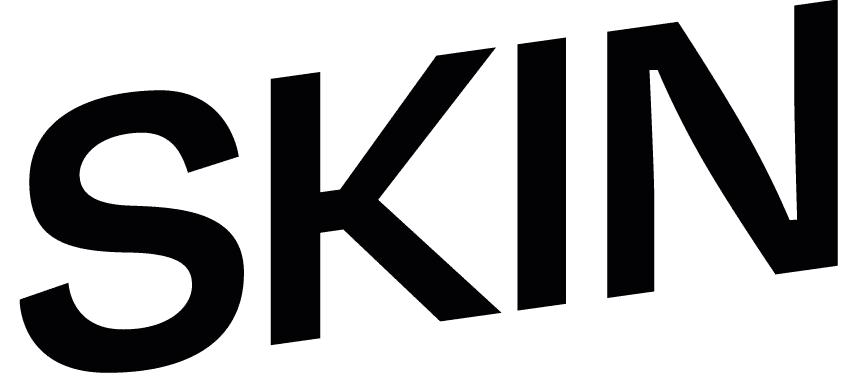Acne Treatments
Get rid of breakouts for good with a personalized skincare solution
- This page has been written by Winke

Tackling Stubborn Acne at SKIN
Is persistent acne impacting your skin’s health and your confidence? At SKIN, we understand how challenging dealing with acne can be.
Our team, composed of skilled skin specialists, specializes in effective acne treatments, acknowledging the psychological toll of persistent skin issues. While some find relief in over-the-counter solutions, many require the expertise of a skin therapy specialist for more stubborn cases.
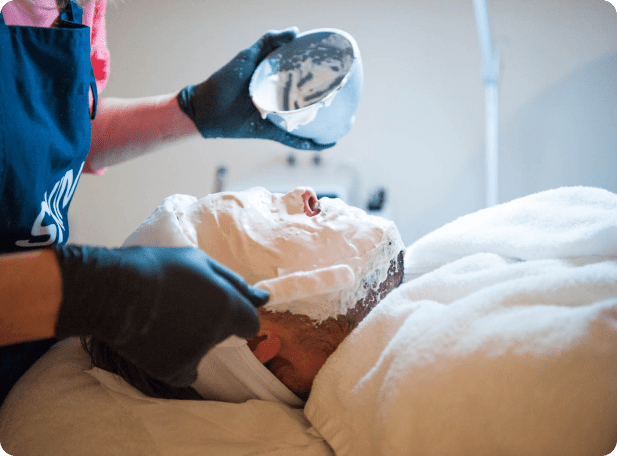
Get in touch
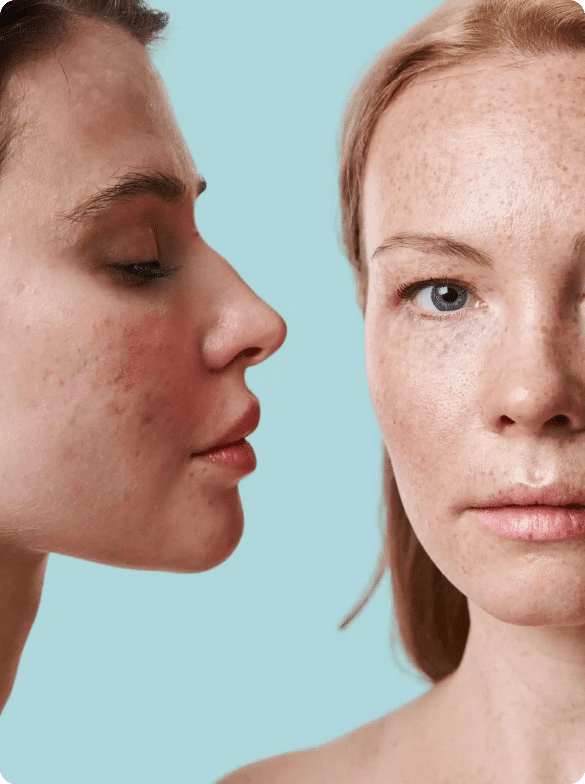
Why Book with us
A Personalized Acne Treatment Plan
Tailored to your unique skin needs and adaptable as your skin evolves.
Extensive Experience
Over 4,500 clients successfully treated every year, showcasing our expertise and trust.
Free, No-Obligation Consultation
Start your journey to clear skin with a complimentary consultation, free of any obligations.
Convenient Locations
Accessible care with two clinics located in Amsterdam, making it easier for you to visit us.
Partnership with Health Insurance
We have contracts with health insurance providers, potentially making treatments more affordable for you.
Who do we treat?
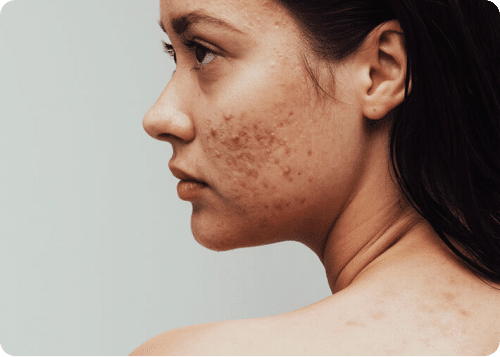
Adult Acne
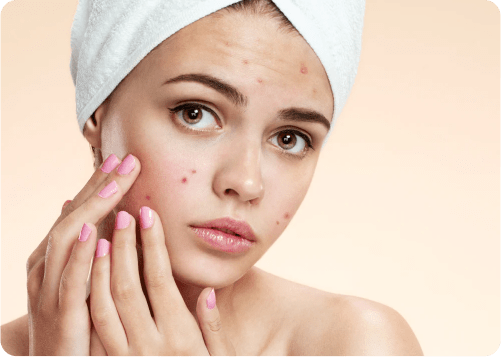
Teenage Acne
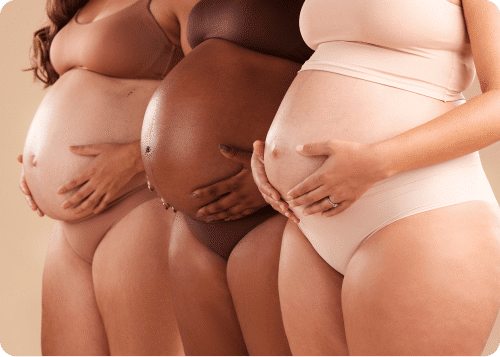
Pregnacy Acne
Clear Skin
Facial Treatments
Efective Skincare
Senior Therapists
Latest Technologies
- Quote from SKIN therapist
We don’t just aim for quick, temporary solutions; our goal is to provide sustainable, long-term results. This means carefully crafting a treatment plan that evolves with your skin, adjusting our strategies as we progress, and providing ongoing support. Remember, achieving and maintaining clear skin is a continual process, not an overnight miracle.”
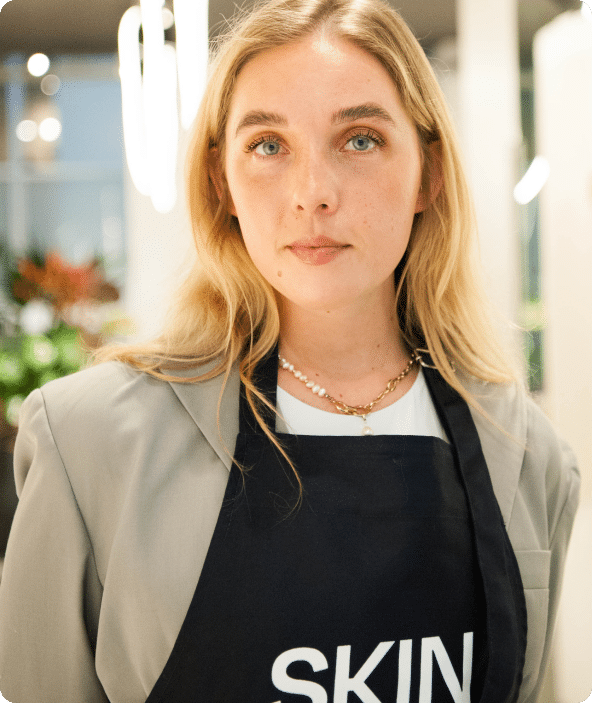
How Do We Treat Acne?


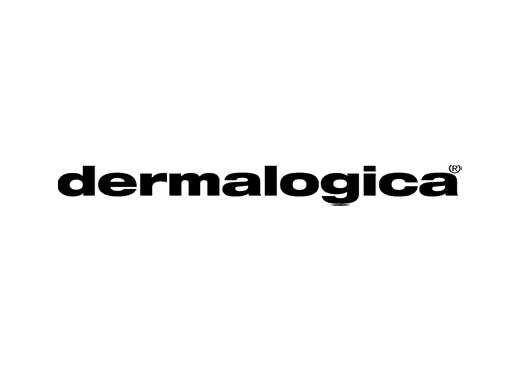



Our range of acne treatments includes:
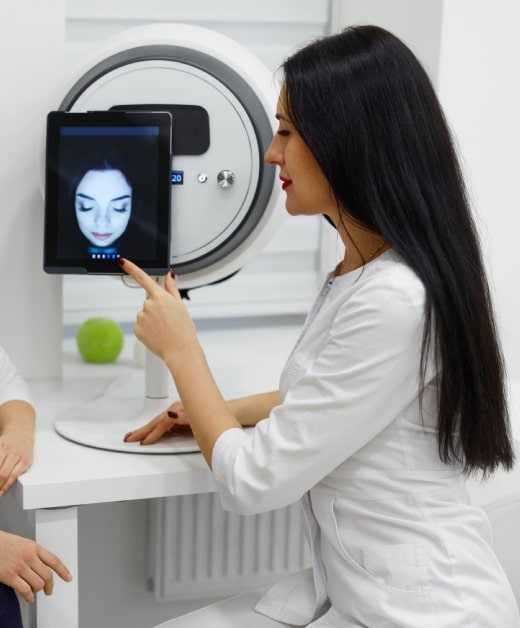
What to Expect During Your Acne Treatment Journey
STEP ONE
Initial Consultation:
At your first visit, we gather essential personal information to understand your acne concerns, treatment goals, and expectations. This is a vital step in tailoring our approach to your specific needs.
STEP TWO
Comprehensive History Review:
During the consultation, we delve into your medical and skin history. A detailed questionnaire, covering topics such as allergies, medication usage, and other health factors, will be conducted by our skin specialist. This information is crucial to ensure your skin’s safety and the effectiveness of the chosen treatment.
STEP TREE
In-Depth Skin Analysis:
Utilizing advanced skin analysis technology, we assess the condition of your skin. This device captures and analyzes images under various filters, providing a detailed view of both the superficial and deeper layers of your skin. This analysis is key in pinpointing specific issues and determining the most effective treatment approach.
STEP FOUR
Personalized Treatment Plan:
Based on the consultation and skin analysis findings, our skin specialist will create a personalized treatment plan or routine, tailored to address your unique skin concerns and goals.
STEP FIVE
Treatment Session:
If you choose to have a treatment immediately following the consultation, we allocate additional time for this. The commencement of your treatment plan can begin without delay. Please note, the cost may vary depending on the specific treatment selected.

Hear From Our Happy Clients
 Tipo Ta2023-12-11Vriendelijk en professioneel personeel.
Tipo Ta2023-12-11Vriendelijk en professioneel personeel. Hassan Meftah2023-11-08Leuk professioneel personeel. Als zeer prettig ervaren.
Hassan Meftah2023-11-08Leuk professioneel personeel. Als zeer prettig ervaren. Sarah Bo2023-10-18
Sarah Bo2023-10-18 Gloria van Breukelen2023-09-15
Gloria van Breukelen2023-09-15 Tim Craig2023-09-15As a 49 year old man with no more experience of facial care than smothering myself with "Nivea for Men" I was driven to the world of face care by a very dry, flakey face. So with some trepidation I was booked for a facial with Nancy at SKIN. It was a absolutely fantastic experience - Nancy explained everything that was going on very clearly and steamed, smeared, wiped, squeezed and blasted by face with powerful red light. I've now got a routine to care for my face and no more excessive dryness. Will be back for sure!
Tim Craig2023-09-15As a 49 year old man with no more experience of facial care than smothering myself with "Nivea for Men" I was driven to the world of face care by a very dry, flakey face. So with some trepidation I was booked for a facial with Nancy at SKIN. It was a absolutely fantastic experience - Nancy explained everything that was going on very clearly and steamed, smeared, wiped, squeezed and blasted by face with powerful red light. I've now got a routine to care for my face and no more excessive dryness. Will be back for sure! Gulsum2023-07-31Een Advanced Skin Facial treatment bij Winke gehad. Ik werd er fijn ontvangen met een korte intro, omdat ik momenteel zwanger ben werden er een aantal dingen van de lijst geschrapt. Hiervoor in de plaats een infrarood therapie gehad, kortom veel aandacht en liefde voor klanten. De fijne producten en uitleg bij elke stap zorgden voor een aangenaam gevoel. Ik ben blij en kom hier zeker weer langs!
Gulsum2023-07-31Een Advanced Skin Facial treatment bij Winke gehad. Ik werd er fijn ontvangen met een korte intro, omdat ik momenteel zwanger ben werden er een aantal dingen van de lijst geschrapt. Hiervoor in de plaats een infrarood therapie gehad, kortom veel aandacht en liefde voor klanten. De fijne producten en uitleg bij elke stap zorgden voor een aangenaam gevoel. Ik ben blij en kom hier zeker weer langs! Jakob Coenen2023-07-14Erg schoon
Jakob Coenen2023-07-14Erg schoon Samantha R2023-07-11I don’t often write reviews, but this one deserves attention! After 4 years of struggling with skin issues, i was referred by a friend to Dr Zabaleta and she was adamant that he had made her skin “ridiculously beautiful”! After just 2 treatments I saw some significant improvement. Dr Armando customizes the treatment to the skin type and even considers the impact and reaction of well known products on my tanned, ultra sensitive skin which required a much more delicate approach and with basic products. Previously, I’ve had spent €€€€ on products and treatments over the last 4 years - that were actually causing more damage to my skin, until I discovered Dr Zabaleta and his team. In my intake, he considered medical & lifestyle topics which also helped to spotlight- the true underlying cause of the skin issue. I didn’t feel oversold as the products reccomended are easily accessible and don’t cost a fortunate and he never imposes any of it! He is very direct to even tell you when you don’t need a treatment! 😅 All in all - great customer service and support. A very happy client here and would totally recommend! 6 stars for me! Thank you Team!Google rating score: 4.8 of 5, based on 159 reviews
Samantha R2023-07-11I don’t often write reviews, but this one deserves attention! After 4 years of struggling with skin issues, i was referred by a friend to Dr Zabaleta and she was adamant that he had made her skin “ridiculously beautiful”! After just 2 treatments I saw some significant improvement. Dr Armando customizes the treatment to the skin type and even considers the impact and reaction of well known products on my tanned, ultra sensitive skin which required a much more delicate approach and with basic products. Previously, I’ve had spent €€€€ on products and treatments over the last 4 years - that were actually causing more damage to my skin, until I discovered Dr Zabaleta and his team. In my intake, he considered medical & lifestyle topics which also helped to spotlight- the true underlying cause of the skin issue. I didn’t feel oversold as the products reccomended are easily accessible and don’t cost a fortunate and he never imposes any of it! He is very direct to even tell you when you don’t need a treatment! 😅 All in all - great customer service and support. A very happy client here and would totally recommend! 6 stars for me! Thank you Team!Google rating score: 4.8 of 5, based on 159 reviews
Before & After
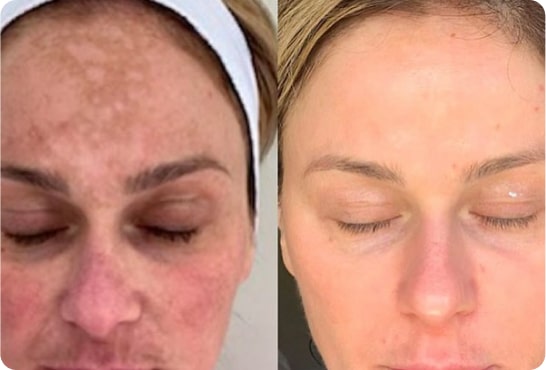
Skin Concern: Acne
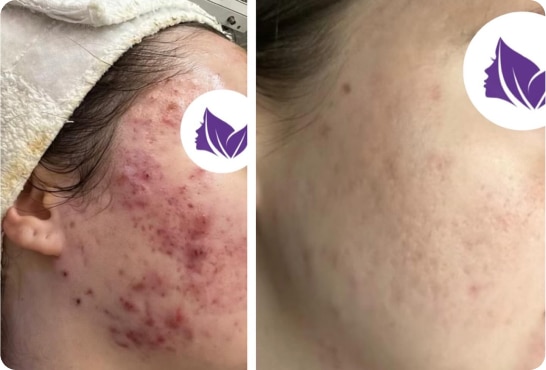
Skin Concern: Acne
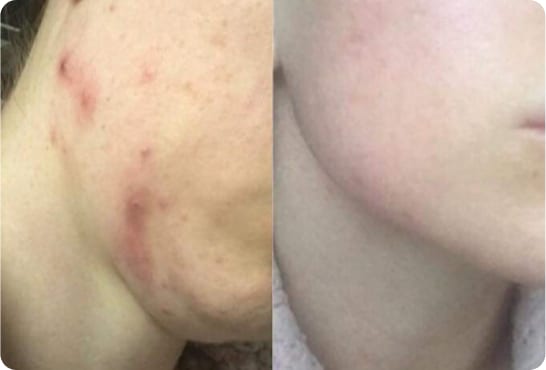
Skin Concern: Acne
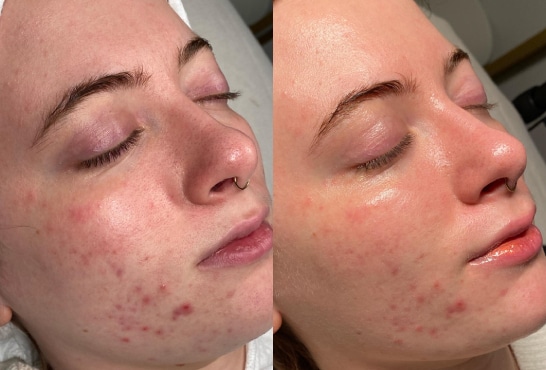
Skin Concern: Acne
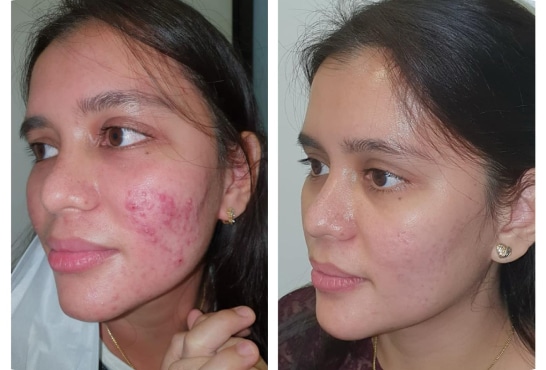
Skin Concern: Acne
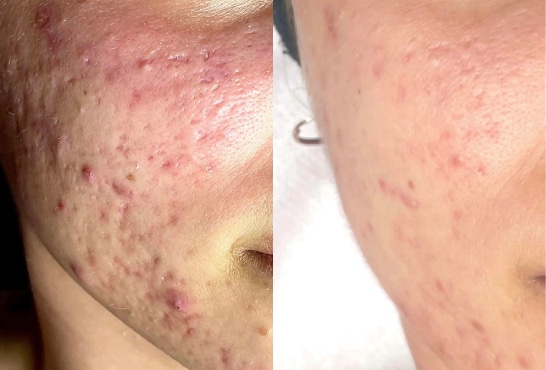
Skin Concern: Acne
Questions? We Have Answers.

Acne is a long-term skin condition that includes several types of lesions, including: blackheads, whiteheads, pimples, nodules, and cysts. Acne is caused by decreased skin cell shedding, increased amounts of sebum (oil produced by glands), inflammation (swelling, redness, pain) and bacteria (P. acnes).
Acne is a common skin condition that occurs when hair follicles become clogged. Sebum (oil that helps keep the skin from drying out) and dead skin cells clog pores, causing outbreaks of lesions, commonly known as pimples. Most commonly, the breakouts occur on the face, but they can also appear on the back, chest, and shoulders.
Other factors such as genetics, hormones, mechanical stimulation (squeezing, squeezing, rubbing), certain medications (corticosteroids), and certain cosmetics can also affect acne. Untreated acne affects the overall quality of life and can cause pigment changes, scarring and emotional stress.
Acne accounts for more than 3.5 million general practitioner appointments per year. It affects 80% of people at some point between 11 and 30 years of age. During adolescence, acne is more common in male than female patients. Acne can also occur in adults and is more prevalent in women. It can develop for the first time over the age of 25 years and is thought to affect up to 20% of women and 8% of men. Of those suffering with the disease, 20% have severe disease that is likely to lead to scarring.
Acne is characterised by comedones, papules, pustules, nodules and cysts, as follows:
- Comedones are the most basic acne lesion and can be open or closed. Closed comedones (whiteheads) are small plugged follicles whose contents are not exposed to the skin surface. Open comedones (blackheads) are small follicles with dilated openings onto the skin. The black colour results from oxidation of the debris within the follicle.
- Papules are small, usually red, raised elevations of the skin.
- Pustules resemble papules but have a central pocket of pus.
- Nodules and cysts are larger painful swellings usually more than 5 mm in size.
A patient with acne usually presents with a history of acne breakouts, most commonly affecting the face, back, chest and shoulders. You may have symptoms of pain, redness or tenderness. Additionally, acne can have a psychological impact, regardless of the severity of disease.
The different types of acne include:
- Pimples (pustules): Pus-filled bumps
- Papules: Small discoloured bumps often red to purple or darker than your natural skin tone.
- Blackheads: Plugged pores with a black top.
- Whiteheads: Clogged pores with a white top.
- Nodules: Large lumps under your skin that are painful.
- Cysts: Painful fluid-filled (pus) lumps under your skin.
Acne is a skin condition caused by clogged pores. The pores can become clogged with sebum and dead skin cells, which can lead to the appearance of pimples, blackheads and other rashes. Bacteria can also play a role in the development of acne.
The bacteria Propionibacterium acnes can get into the pores and cause inflammation. The inflammation can lead to the appearance of pimples, pustules, and other forms of acne. So while bacteria can play a role in the development of acne, it’s not the only cause. Other factors, such as hormones, genetics, and certain foods, can also contribute to the development of acne.
Stage 1 Mild: blackheads, whiteheads, closed comedones, few inflammatory breakouts
Stage 2 Mild/moderate: blackheads and whiteheads with some inflammatory papules, and pustules
Stage 3 Moderate: many blackheads and whiteheads, with small and large inflammatory papules, pustules.
Stage 4 Severe: Many blackheads, whiteheads, and inflammatory breakouts: papules, pustules, cysts and nodules.
References:
Anjali Mahto, (2017). Acne vulgaris, Medicine, 45;6, pp. 386-389, 1357-3039. https://doi.org/10.1016/j.mpmed.2017.03.003 .
Chovatiya R. (2021). Acne Treatment. JAMA. 326(20):2087. doi:10.1001/jama.2021.16599 .
Acne may be caused by decreased skin turnover and shedding, increased production of sebum (an oily, waxy substance produced by glands to lubricate the skin), and certain types of skin bacteria. Other factors include genetics, hormones, mechanical stimulation (friction, rubbing, picking, squeezing), certain drugs (such as corticosteroids), and skin care products and cosmetics.
- Hormones: An increase in androgens, which are male sex hormones, can lead to acne. These normally increase in both boys and girls during puberty and cause the sebaceous glands to enlarge and produce more sebum. Hormonal changes related to pregnancy can also cause acne.
- Family history: Researchers believe that you are more likely to get acne if your parents had acne.
- Medicines: Certain medications, such as those containing hormones, corticosteroids, and lithium, can cause acne.
- Age: People of all ages can get acne, but it’s more common in teens.
The following do not cause acne but can make it worse.
- Diet: Some studies show that eating certain foods can make acne worse.
- Stress: Pressure from sports helmet, tight clothing or backpacks.
- Environmental irritants: such as pollution and high humidity. Picking or Squeezing pimples or exfoliating your skin too rough.
The best treatment for your acne will depend on the severity of the acne and other factors, such as your age, skin type, and any allergies you may have. If you are unsure about which treatment is best for your acne, it is wise to consult our dermatologists for advice.
You can book a digital consultation here
There are several acne treatments available, including:
- Plason Treatment: This treatment uses a device that ionizes air to kill acne bacteria.
- Chemical peels: A chemical peel is a treatment in which a chemical agent is applied to the skin to remove the top layer of the skin. This can help exfoliate the skin and prevent breakouts.
- Extractions in the SKIN Facial: a SKIN Facial is a facial treatment in which the skin is cleaned, exfoliated and hydrated. During the treatment, extractions can also be performed to remove blackheads and pimples.
- Aquapeel: This treatment uses a device that provides mechanical and chemical exfoliation. It can help exfoliate the skin and prevent pimples from forming.
- Good home products: It is important to use the right skin care products if you suffer from acne. Choose products that are non-comedogenic (non-pore-clogging) and specifically formulated for acne-prone skin
There are different types of treatments for acne, depending on the severity, you will receive individual advice on which treatment or combination of treatments will give the best result. It can take 2-3 months to see results with acne treatments.
You can see a visible difference in the reduction of scarring, inflammation and scarring after 6-12 months. The goal is to maintain healthy skin on a regular treatment regimen to maintain and maintain the skin’s barrier function. You may need more frequent sessions in the first few months of treatment. We also customize treatment schedules based on your needs and preferences.
Purging is a common side-effect of acne treatments as acne lesions are caused by blockages in the pores, below the surface of the skin. When acne-treating actives are used (retinoids or AHA/BHA ingredients) the skin cells are dissolved to decongest the pores, this may cause a larger number of breakouts initially which will usually subside in subsequent weeks or months.

